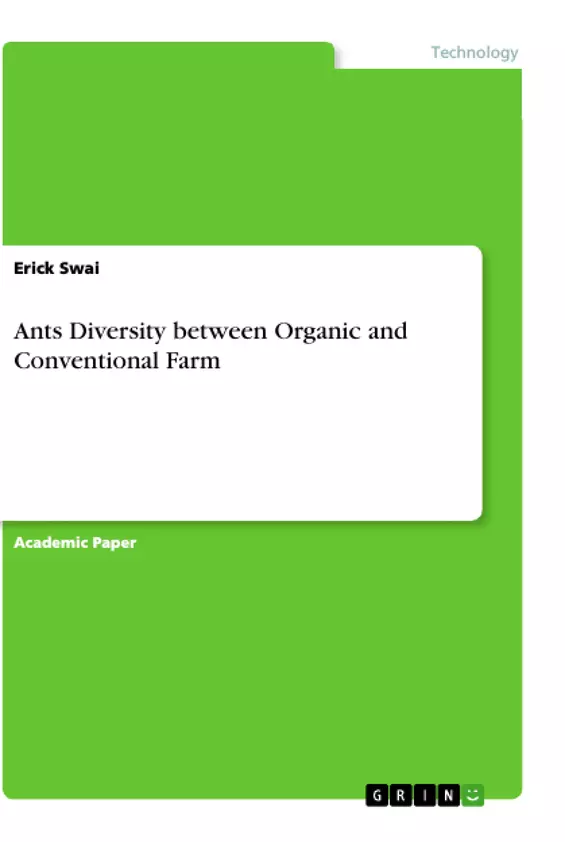The diversity of ants in conventional and organic farms has not been investigated in Tanzania, therefore, the study aims at investigating that and provides knowledge for ants conservation. Machare Coffee Estate is among unique plantations in which both conventional and organic farming of coffee are performed. The study contributes to the existing body of knowledge on the influence of these farming practices on ants’ diversity. Knowledge about ants diversity is useful for the conservation of other species which associate with ants in the ecological chain.
Therefore from such a gap in knowledge, this study intends to compare the diversity of ants in organic and conventional farms. Moreover, the findings from this study will aid in biodiversity management and conservation in the area in particular.
Ants play a vital-ecological role as they influence soil movement, nutrient cycling and water availability in their habitat. Habitat destruction and the use of Agrochemicals are regarded as among the factors that affect the diversity of ants. Machare Coffee Estate is one of the farms which practice both organic and conventional farming. To reveal whether there is a difference in diversity between these two practices this study was conducted at Machare Coffee Estate for three weeks. The study used four transects of 80 m with four quadrants of 10x10 m within it, where 6 pitfall traps with an inter pitfall distance of 3 m were laid down per quadrant on both sites. A total number of 96 pitfall traps were used per site. A total of 2381 ants from five subfamilies were collected. Ant’s diversity was analyzed by the Shannon Wiener index and a t-test was used to test the hypothesis.
Keywords; Ants, diversity, conventional farming, organic farming
Inhaltsverzeichnis (Table of Contents)
- INTRODUCTION
- Background Information
- Problem statement and Justification
- Objectives
- General Objective
- Specific Objectives
- Hypothesis
- Null hypothesis
Zielsetzung und Themenschwerpunkte (Objectives and Key Themes)
This study investigates the diversity of ants in organic and conventional coffee farms at Machare Coffee Estate in Tanzania. The research aims to determine if there is a significant difference in ants' diversity, abundance, and species richness between the two farming practices. The findings will contribute to the existing knowledge on the influence of agricultural practices on ant biodiversity and its implications for ecosystem management and conservation.
- Ants as ecosystem engineers and their role in soil health, nutrient cycling, and water availability
- The impact of agricultural intensification, particularly the use of agrochemicals, on ant diversity
- Comparison of ant diversity, abundance, and species richness between organic and conventional farming practices
- The importance of ants in maintaining ecological balance and their contribution to biodiversity conservation
- The need for sustainable agricultural practices that promote biodiversity and ecosystem health
Zusammenfassung der Kapitel (Chapter Summaries)
- INTRODUCTION
- This chapter provides an overview of the importance of biodiversity conservation, particularly in agroecosystems. It highlights the detrimental effects of agricultural intensification, especially the use of agrochemicals, on biodiversity. The chapter introduces ants as important ecosystem engineers and discusses their ecological roles.
- The research problem is presented, emphasizing the lack of studies comparing ant diversity in organic and conventional farms in Tanzania. The study's objectives and hypotheses are clearly stated.
Schlüsselwörter (Keywords)
Ants, diversity, conventional farming, organic farming, biodiversity, agroecosystem, soil health, nutrient cycling, water availability, agrochemicals, ecosystem engineers, conservation, sustainable agriculture.
- Arbeit zitieren
- Erick Swai (Autor:in), 2021, Ants Diversity between Organic and Conventional Farm, München, GRIN Verlag, https://www.hausarbeiten.de/document/1139038


